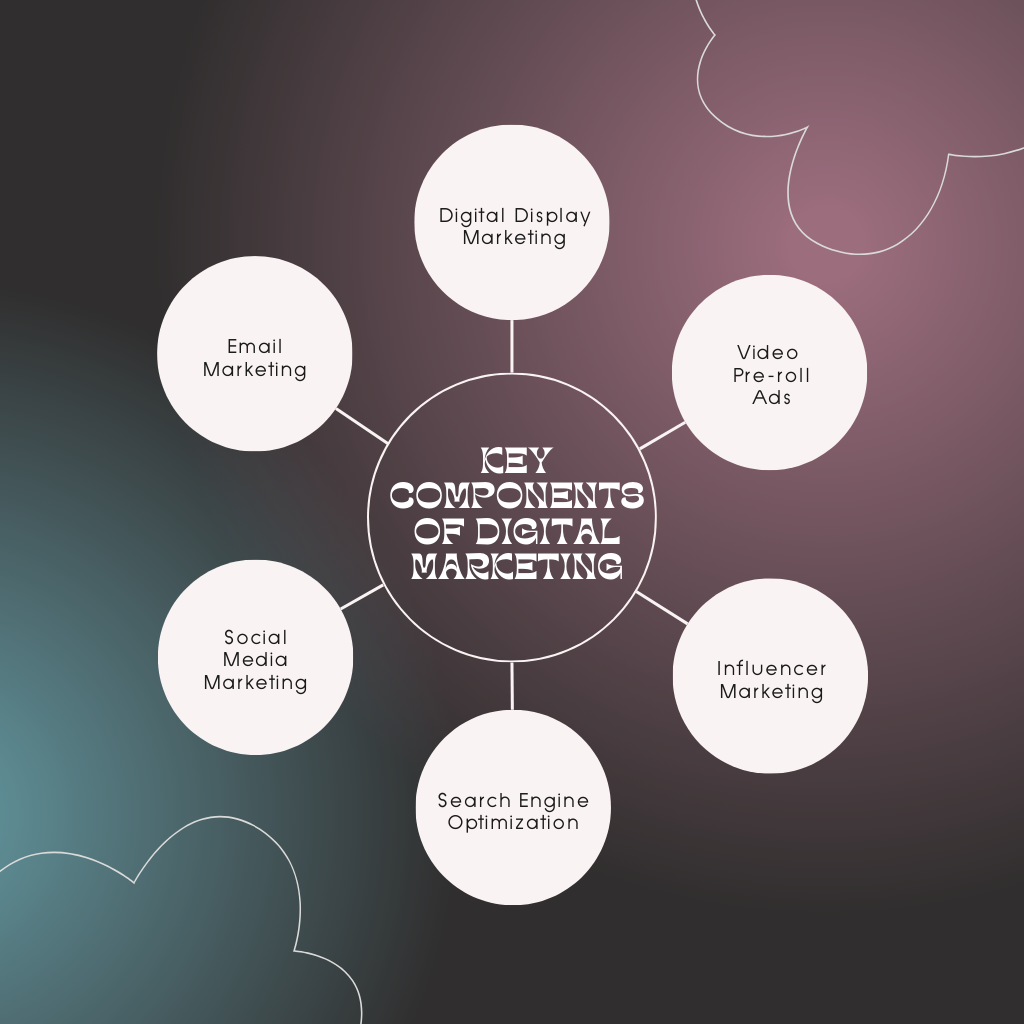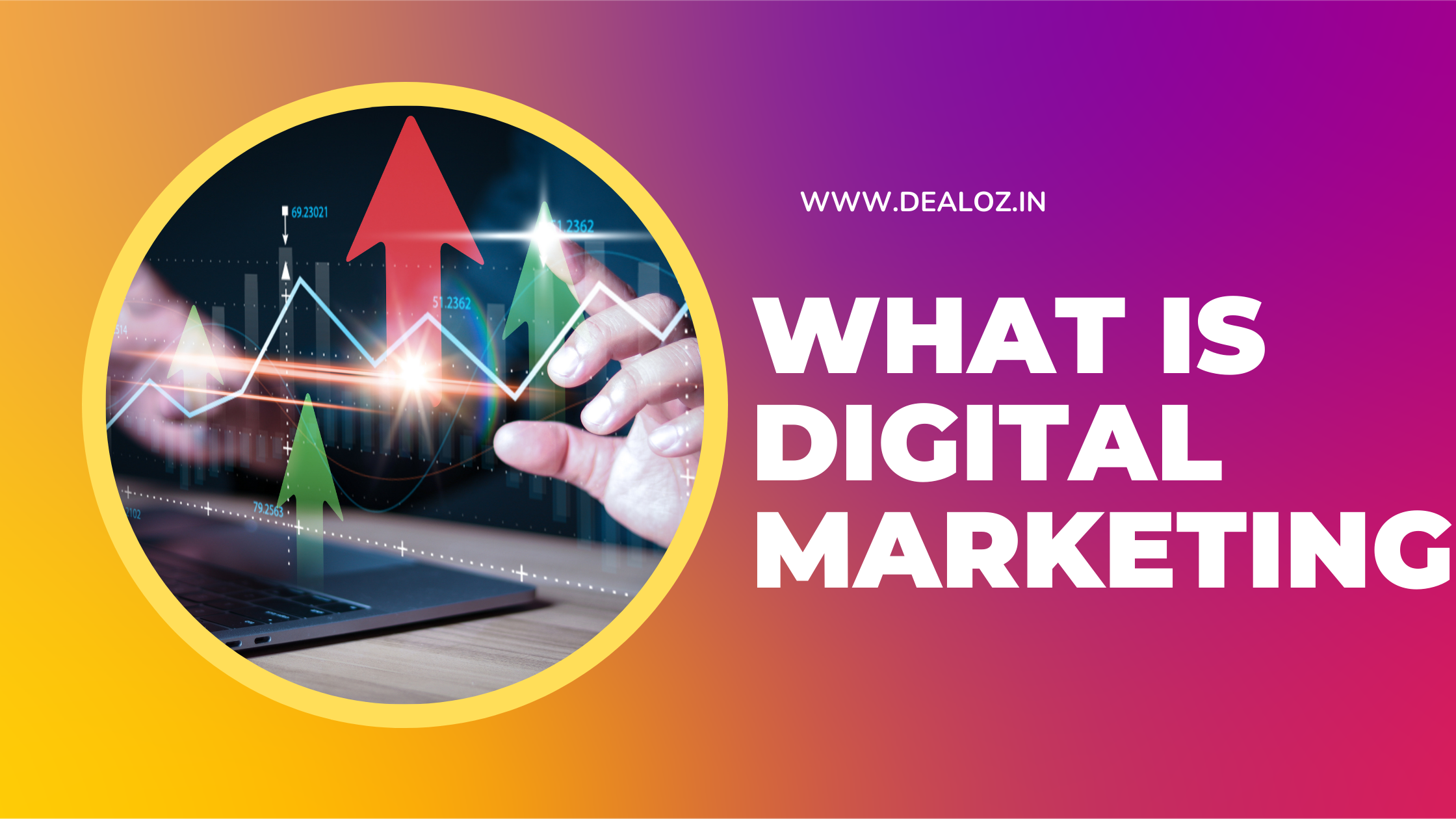Understanding the Basics of Digital Marketing
Digital marketing refers to the use of digital channels, platforms, and technologies to promote products, services, or brands to a targeted audience. It encompasses a wide range of online strategies, tools, and practices aimed at engaging users, generating leads, and driving sales. Unlike traditional marketing methods, digital marketing leverages the power of the internet and electronic devices to reach consumers directly and interactively.
In today’s fast-paced and tech-driven world, digital marketing has become a crucial component of any successful business strategy. With more than 5 billion internet users globally, businesses are focusing their efforts on capturing their target audience where they spend most of their time—online.
Key Components of Digital Marketing
Digital marketing is a broad field that includes several key components, each designed to achieve specific marketing objectives. Below are the primary aspects of digital marketing:
1. Search Engine Optimization (SEO)
SEO involves optimizing a website to improve its ranking on search engine results pages (SERPs). By using relevant keywords, creating high-quality content, and building backlinks, businesses can increase organic traffic to their websites. SEO is a long-term strategy that focuses on visibility and user experience.
2. Content Marketing
Content marketing focuses on creating and distributing valuable, relevant, and engaging content to attract and retain a clearly defined audience. This includes blogs, articles, videos, infographics, podcasts, and ebooks. The goal is to educate, entertain, and inspire users while subtly promoting a brand.
3. Social Media Marketing
Social media marketing involves promoting a business or product on platforms like Facebook, Instagram, Twitter, LinkedIn, and TikTok. Businesses use these platforms to engage with their audience, share updates, run paid ads, and analyze user behavior.
4. Pay-Per-Click Advertising (PPC)
PPC advertising allows businesses to display ads on search engines, social media platforms, and other websites. Advertisers pay a fee each time a user clicks on their ad. Google Ads is one of the most popular PPC platforms, offering businesses the ability to target specific keywords and demographics.
5. Email Marketing
Email marketing is one of the most effective digital marketing strategies. Businesses use email to communicate directly with their audience, providing updates, special offers, and personalized content. Building a strong email list is critical for this approach to succeed.
6. Affiliate Marketing
Affiliate marketing involves partnering with individuals or other businesses (affiliates) to promote a product or service. Affiliates earn a commission for each sale or lead generated through their referral link. This strategy expands a brand’s reach and builds trust through third-party endorsements.
7. Influencer Marketing
Influencer marketing leverages the popularity and credibility of social media influencers to promote products or services. By collaborating with influencers who have a large and engaged following, businesses can effectively reach new audiences.
8. Mobile Marketing
Mobile marketing focuses on reaching users on their smartphones and tablets. Strategies include SMS marketing, in-app advertising, mobile-friendly website design, and location-based marketing to deliver personalized and timely messages.
9. Analytics and Data Insights
Analytics tools like Google Analytics, SEMrush, and HubSpot help businesses track the performance of their digital marketing campaigns. By analyzing data, marketers can identify trends, measure ROI, and make informed decisions to optimize future campaigns.

Advantages of Digital Marketing
Digital marketing offers numerous benefits that make it a powerful tool for businesses. Some of the key advantages include:
1. Cost-Effectiveness
Compared to traditional marketing methods like TV and print advertising, digital marketing is often more affordable. Small businesses can reach a wide audience without a significant financial investment.
2. Global Reach
With the internet, businesses can expand their reach beyond geographical boundaries. Digital marketing allows even small companies to target international audiences effectively.
3. Targeted Advertising
Digital marketing enables precise targeting based on demographics, interests, online behavior, and more. This ensures that marketing efforts are focused on individuals most likely to convert.
4. Interactivity and Engagement
Through social media, live chats, and other online platforms, businesses can engage directly with their audience. This fosters trust, builds relationships, and encourages loyalty.
5. Measurable Results
Unlike traditional marketing, digital campaigns provide measurable results in real time. Businesses can track metrics such as website traffic, conversion rates, and user behavior to evaluate their success.
6. Flexibility and Scalability
Digital marketing campaigns can be easily adjusted to adapt to changing market conditions or user preferences. Additionally, these campaigns can scale as businesses grow, making them suitable for companies of all sizes.
Challenges in Digital Marketing
Despite its numerous advantages, digital marketing also comes with challenges that businesses need to address:
1. Intense Competition
The online marketplace is highly competitive, making it difficult for businesses to stand out. Companies must constantly innovate and refine their strategies to remain relevant.
2. Evolving Technology
The digital landscape changes rapidly, with new tools and platforms emerging regularly. Marketers must stay updated to leverage the latest trends and technologies effectively.
3. Privacy Concerns
With increasing concerns about data privacy and stricter regulations like the GDPR, businesses must ensure they handle user data responsibly and transparently.
4. Ad Fatigue
Users are exposed to a high volume of ads daily, which can lead to ad fatigue. To overcome this, businesses must create engaging and non-intrusive campaigns.
Future Trends in Digital Marketing
As technology evolves, digital marketing is also expected to undergo significant transformations. Here are some emerging trends to watch:
1. Artificial Intelligence (AI)
AI is revolutionizing digital marketing by enabling more personalized experiences, automating tasks like chatbots and email marketing, and analyzing vast amounts of data quickly.
2. Voice Search Optimization
With the growing popularity of voice assistants like Alexa and Siri, optimizing content for voice search is becoming crucial for businesses.
3. Video Marketing
Video content continues to dominate online platforms. Live streaming, short-form videos, and interactive content are gaining traction as effective marketing tools.
4. Sustainability Marketing
Consumers are increasingly valuing brands that demonstrate environmental and social responsibility. Businesses that align their marketing efforts with sustainability are likely to gain a competitive edge.
5. Augmented Reality (AR) and Virtual Reality (VR)
AR and VR technologies are being used to create immersive and interactive customer experiences, particularly in industries like retail and real estate.
Conclusion
Digital marketing is an essential aspect of modern business, offering unparalleled opportunities to connect with consumers and drive growth. By understanding its components, leveraging its advantages, and staying ahead of trends, businesses can achieve remarkable success in the digital age. However, the dynamic nature of the field requires continuous learning and adaptation to ensure sustained effectiveness.


